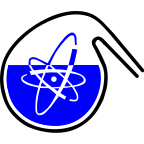Speaker
Description
Alpha radionuclide therapy (ART) is a very powerful tool for the treatment of small tumour metastases. Due to their short range and high LET, alpha particles are much more efficient at killing cells than the commonly used beta radiation. Furthermore, their short range stops them from destroying neighbouring healthy cells. One of the main problems which still needs to be solved before ART can successfully be implemented in the clinic is the recoil problem: upon alpha-decay the daughter nuclide receives a recoil energy decoupling it from any targeting agent, allowing it to diffuse throughout the body to irradiate healthy tissue.
We have developed polymeric nanocarriers capable of retaining the recoiling daughters of the alpha-emitting radionuclide 225Ac and thus limit healthy tissue toxicity. Using a Monte Carlo-based simulation tool, a number of different polymersome designs have been simulated to optimize the recoil retention. Subsequently, polymersomes have been prepared with 225Ac co-precipitated with an InPO4 nanoparticle inside the vesicle, as the use of high-Z materials results in a much-reduced recoil range as compared to an aqueous environment. Using this new formulation, recoil retentions have improved significantly as compared to earlier published results by Wang et al., where 225Ac was encapsulated using a hydrophilic chelate [1].
Excellent results have been obtained in vitro, where the potential of 225Ac-loaded polymersomes has been evaluated in U87 glioblastoma multicellular spheroids. We have found that polymersomes distribute themselves throughout the spheroid after 4 days which, considering the long half-life of 225Ac (9.9 d), allows for irradiation of the entire spheroid. Our studies indicated that even at low radionuclide activity the 225Ac polymersomes deliver a very high dose, with spheroid growth inhibition was already observed at just 0.1 kBq of 225Ac added. The therapeutic efficacy upon intratumoural administration of 225Ac-polymersomes has been tested in vivo in BALB/c mice bearing an MDA-MB-231 tumour. The retention of the vesicles upon intratumoural administration has been shown to be very high (46.0 ± 21.5% and 37.0 ± 23.9% at 1 day and 7 day p.i. respectively), whereas the tumours which have been injected with 225Ac-DOTA retained less than 1% (1 day p.i.), demonstrating the advantage of using the vesicles intratumourally. The accumulation of recoiled 213Bi in the kidneys was limited, with a kidney to tumour ratio of only 1:30. Immunohistochemical analysis of the tumours has shown an increase in double-stranded breaks in the group treated with 225Ac-polymersomes, indicating their suitability for tumour irradiation.
Large strides have thus been made towards the clinical implementation of polymersomes in ART. The incorporation of nanoparticles in polymersomes has allowed for high retention of the 225Ac mother and daughter nuclides, and both in vitro as well as in vivo their potential in destroying tumours has been demonstrated.

